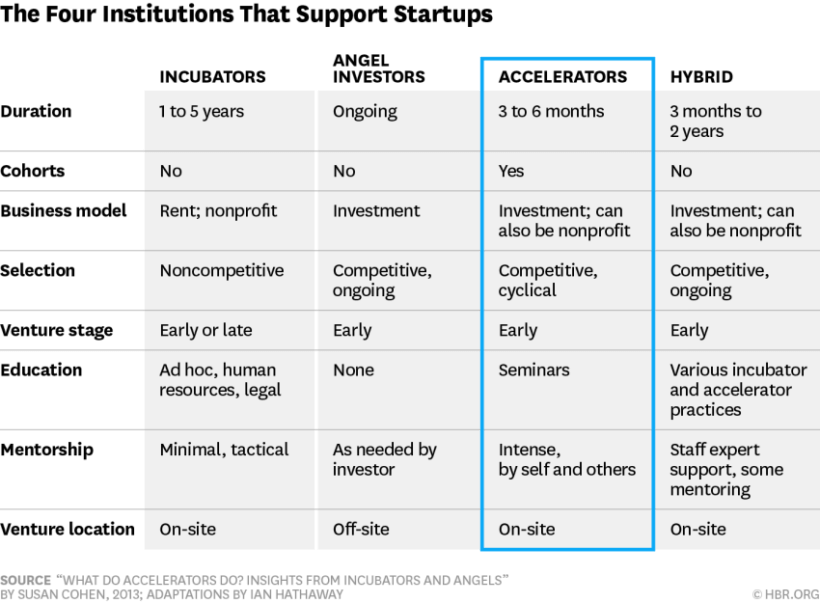What’s a Startup Accelerator Anyway?
The startup accelerator. No longer the new kid on the block, it remains an enigma – to a certain extent. So, what’s the lowdown on this latest player to enter the “entrepreneurial ecosystem” as we like to call it?

Let’s be honest. It’s fair to say that the buzz, hype and (mis)information floating around about the ongoing tech startup boom, and the various “organizations” supporting them, can easily confuse. A prime example are some of the running definitions about what a startup accelerator is, what they do and how they fit into the grand scheme of things.
You could say that they are still evolving. Fundamentally, as the Harvard Business Review (HBR) rightly point out, it’s easy to misunderstand startup accelerators. They are mistakenly put in the same bracket with other institutions supporting early-stage startups, like angel investors, incubators, and venture capitalists.
The “experts” view
So what’s the truth? Well, a classic up-to-date definition reads something like this: “Startup accelerators support early-stage, growth-driven companies through education, mentorship, and financing in a fixed-period, cohort-based setting which culminates in a graduation or ‘demo day’.” – Brookings Institution.
Pretty compact and concise. In the context of the Brookings analysis, Susan Cohen of the University of Richmond and Yael Hochberg of Rice University elaborates on it. Here’s what she has to say:
“Broadly speaking, [accelerators] help ventures define and build their initial products, identify promising customer segments, and secure resources, including capital and employees. More specifically, accelerator programs are programs of limited-duration—lasting about three months—that help cohorts of startups with the new venture process.
They usually provide a small amount of seed capital, plus working space. They also offer a plethora of networking opportunities, with both peer ventures and mentors, who might be successful entrepreneurs, program graduates, venture capitalists, angel investors, or even corporate executives.
Finally, most programs end with a grand event, a “demo day” where ventures pitch to a large audience of qualified investors? OR “None of the other previously mentioned early-stage institutions — incubators, angel investors, or seed-stage venture capitalists — have these collective elements.
Accelerators may share with these others the goal of cultivating early-stage startups, but it is clear that they are different, with distinctly different business models and incentive structures.”
Where a startup accelerator fits in
To truly understand the anatomy of a startup accelerator, let’s check out a comparison. It just so happens that those nice people at the HBR have a quick at-a-glance guide.

Pretty crystal clear, right? Well, not exactly. It is a good, broad guide to show some key characteristics. The thing is, the concept is still a work-in-progress as we speak. It’s alive, and evolving all the time. This is because not all startup accelerators follow the same approach.
The Starttech way — an upgrade to startup accelerators: the Venture Builder
Which brings me nicely into discussing how we do it at Starttech. Our concept and business approach is the result of much self-reflection. As well as taking into consideration the “classic” approach, we operate as an alternative, lean startup Venture Builder.
Our fixed term is much longer and we offer much more added value. How? By providing invaluable marketing and technical support services, on top of the usual package. And we don’t wait until the end of that period for a ‘demo day’. Every day is a demo day for us!
In essence, we’re not about short-term provision and a competition-based selection process. We see ourselves as companions. We’re it together, for the journey as much as the end result. We amplify the collective element. So that we don’t just care about profit, we care about growth and success.
An added offering
Now for the specifics. So, apart from providing that all-important early stage funding, being cohort-based and mentorship-driven, we also offer the following:
- UI/UX design support
- Growth marketing
- Brand development
- Technical support
- Admin. resources, such as accounting and legal service
Accelerating success
“So, does your model work?” I hear you ask. Great question. So far so good, is the answer. We’re the first to admit that we have not yet completely proven our approach. Yes, some of our case study success stories speak for themselves. However, the challenge is to hit the mark every time we bring a business into our portfolio. And this is easier said than done.
We aren’t reinventing the wheel by any stretch of the imagination. Just adding a “meta layer” to the current landscape. The goal? Not not just faster growth, but “richer” growth (not only financially), and sustained success for all stakeholders.
Got a startup or business idea and want to apply with Starttech? As long as you have an early prototype of your application, or a product for which there is a well-documented decision to pivot, then contact us for a discussion on how we can bring the business vision to life.
